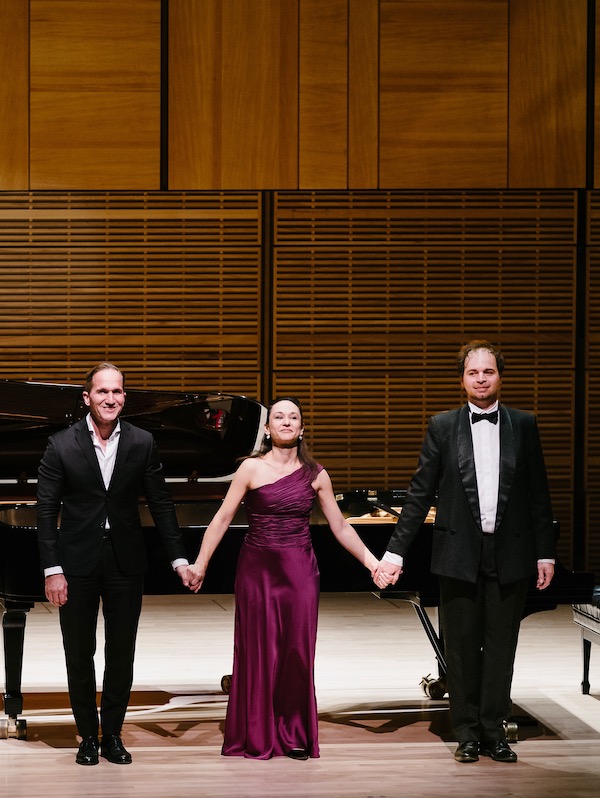If not ideally focused in theme, much terrific playing in a night of Carpathian piano music

Sunday night in Zankel Hall, three pianists (at two pianos), took an ambitious shot at showing this tradition in depth in a concert presentation,”Carpathian Impressions: A Classical and Jazz Piano Evening.” László Borbély, Éva Polgár, and Gábor Varga played pieces by Bartók, Kodály, and Franz Liszt, and improvised with folk songs as the basis. It was full of terrific playing, and if the program as a whole didn’t amount to a successful whole, each individual musical moment was as fine as could be.
Some subjects are so vast and so rich in details that the only way to see them is through the smallest and most specific examples. One such area is the long, fascinating, and vital tradition of music from the Carpathians, which, through the pioneering ethnomusicology of Béla Bartók and Zoltán Kodály, has virtually no separation from the most basic, ancient folk music and the most abstract modern art music.
That seemed something of a paradox: there was excellent music, like Bartök’s Seven Pieces from Mikrokosmos for two pianos, played with skill and palpable excitement. There was a handful of some of Liszt’s more colorful shorter works, and the improvisations—by jazz pianist Varga—were scintillating.
This was not so much too much of a good thing, but simply too much. With an intermission and two quick, prepared encores, this was a two-hour, 15-minute event. The duration became a problem in itself; as Borbély bounded through Liszt’s Csádás macabre after first playing the composer’s Two Csádrás, about two-thirds of the way through the second half, there was a clear sense of fatigue in the audience. In another sense the very length meant music that covered more ground than it needed to but that, by putting up signs to different paths without going down them, was not nearly enough for all the possibilities raised.
This was also aggravated by a sense that the sequence was in flux and not fully thought through. Polgár hinted at this when she introduced the evening from the stage, mentioning that the musicians had reworked the order after the experience playing the previous night.
This made for a superb first half that put the heart of the matter on display. Borbély and Polgár played four of the Mikrokosmos with great élan, then Borbély followed with Bartok’s Allegro Barbaro and the Improvisation on Hungarian Peasant Songs. One heard how the composer broke out the deep elements of Carpathian folk music, the gripping rhythms and phrases, and used them to build more abstract music with direct roots in the earth. Playing the Improvisations in complete, connected sequence, one heard centuries of music, and Bartök’s career, in a compact kaleidoscope of sound.
This was the perfect introduction to three improvisations by Varga. These were absorbing and gorgeous. The pianist had one foot in Bartök and another in Keith Jarrett, building up the dense colors of the former and then, with some specific articulations and the country funk/blues flavor from Jarrett, pulling out a plainspoken line, and following it through. These were all well formed, and the sense of how Carpathian roots could work their way through modern compositions and improvisations was deeply compelling, one wanted to hear more of this.
And there was more Bartök and more improvisations to come, but first there was Kodály and plenty of Liszt. What these two provided in terms of variety they also took away by distracting from the core mission of the concert.
Yes, Liszt’s Hungarian Rhapsody No. 6, played by Polgár, and the Csárdás were built from the rhythms and phrases of the region, but they had less to say about the Carpathians and more to do with how Liszt imagined the region. And as enjoyable as the Kodály was, with lovely playing from Polgár, the selections seemed misplaced; his Meditations sur un motif de Claude Debussy and the short Valsette are lovely, urbane pieces, but neither is a meaningful example of Kodály’s work exploring the traditional music of his land.
The return of Bartók after the Csárdás with the remaining three Mikrokosmos, and two more improvisations by Varga brought the concert back on track, and as with the first half delivered the impressions and fantastic musical pleasures. The encores, with Borbély and Polgár laying down Mikrokosmos Nos. 1 and 5 on one piano and Varga improvising at the other, kept the fun going, and wrapped up the night with a boost.